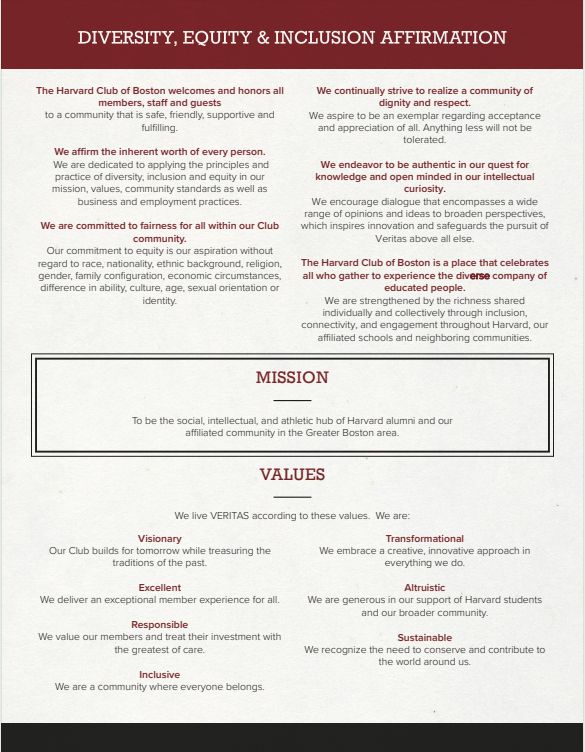The Harvard Club of Boston
For more than a century, venerable private clubs have served as a forum
for people of similar interests to meet and mingle.
Since 1908, when Henry Lee Higginson and a group of 21 Harvard alumni formed the club, the Harvard Club of Boston has ensured the viability of this simple mission.
To sustain its stature as a landmark club, the Harvard Club of Boston has welcomed opportunities to recalibrate its mission in order to position itself as a coveted institution.
The private club industry has been no exception to the COVID-19 pandemic and subsequent economic crisis. Simultaneously, changing demographics and evolving lifestyles have nudged the private club industry to evolve. Contemporary memberships are diverse, complex and have different priorities than those from decades past. Nevertheless, the role of clubs is not waning. Rather, clubs such as the Harvard Club are adapting to the swirling events around them. Recognizing that the Harvard Club’s growth was stagnant and that the key to a club’s success is the vibrancy of membership, General Manager Steve Cummings and the board began
to consider potential changes.
The Harvard Club of Boston is formed around the ties of former students to Harvard University. The student population, and subsequent alumni network, has become increasingly diverse, as recently demonstrated with minorities making up the majority of Harvard’s Class of 2021 for the first time in the school’s 380-year history. These students are the target market for future members.
In light of such developments and while maintaining its tradition of excellence, the leadership of the Harvard Club sought to modernize its mission. Diversity, inclusion and equity have become the cornerstone of the Harvard Club’s mission … all against the backdrop of a crippling global pandemic. (See sidebar on page 29.)
“The club is in a paradigm shift. Therefore, it is essential we redefine and realign strategies with the ‘new normal.’ The club needs to realign to remain relevant during this crisis, while building credibility and influence amongst its evolving membership, and sustainability for the club,” said Cummings.
With the core of the club’s revenue stream reduced dramatically (i.e., declining dues, and declining fees from functions, guestrooms and parking), leadership at the Harvard Club leveraged member engagement to survive the pandemic. They increased digital engagement to deliver services to demonstrate the club’s value to members. New amenities included virtual fitness sessions, virtual speaker series, take-out and curbside pickup and outdoor dining. The club even transformed function spaces into novel social-distance friendly work-from-anywhere areas.
An unexpected benefit of the pandemic, the “virtual club” tapped into a previously inaccessible market of Harvard alumni. Suddenly, fitness attendance tripled. More than 1,500 nonresident members engaged the club services at unprecedented rates with the new offerings. Members from around the world became part of the club community, albeit from miles away.
The meaning of a club membership transcended the four walls of the clubhouse. Evaluating their new mission, the club leadership knew that it should be more “outbound” than fully “inbound,” to serve an expanded network of members. Cummings has committed to imagining alternative ways to deliver value to existing members and to leverage new methods to attract potential new members.
Further, the club has also hired a data analyst to better understand membership demographics. The analyst uses data to identify potential locations for a satellite operation to enhance the member experience, whether that be a sports club in the suburbs or a pub in Harvard Square. According to the general manager, “nothing is off the table.”
In a recent conversation with one of the Harvard Club board members, he asked the following:
1. Who is the most successful taxi company? Uber
2. Who is the most successful hotel company? Airbnb
3. Who is the most successful retailer? Amazon
4. What do they all have in common? They do not own taxis, hotels or retail space.
Is it possible for a club to be successful without a physical place to “meet and mingle?”
According to board member Andy Freed, “The face of Harvard has changed, and so must the club. We do not want to create a place; we want to create a sense of belonging,” he said. “We want to attract the next generation of members not because of our dining and facilities, but because of who we are and what we stand for. The club must represent all alumni and articulate our values implicitly and explicitly.”
The Harvard Club of Boston is transforming into a “member experience” business with an affirmation of who they are, energized with a new mission and values.
In the words of Jerry Garcia, “You do not merely want to be considered the best of the best. You want to be considered the only one that does what you do.”

Club Trends Winter 2021.


